03:00
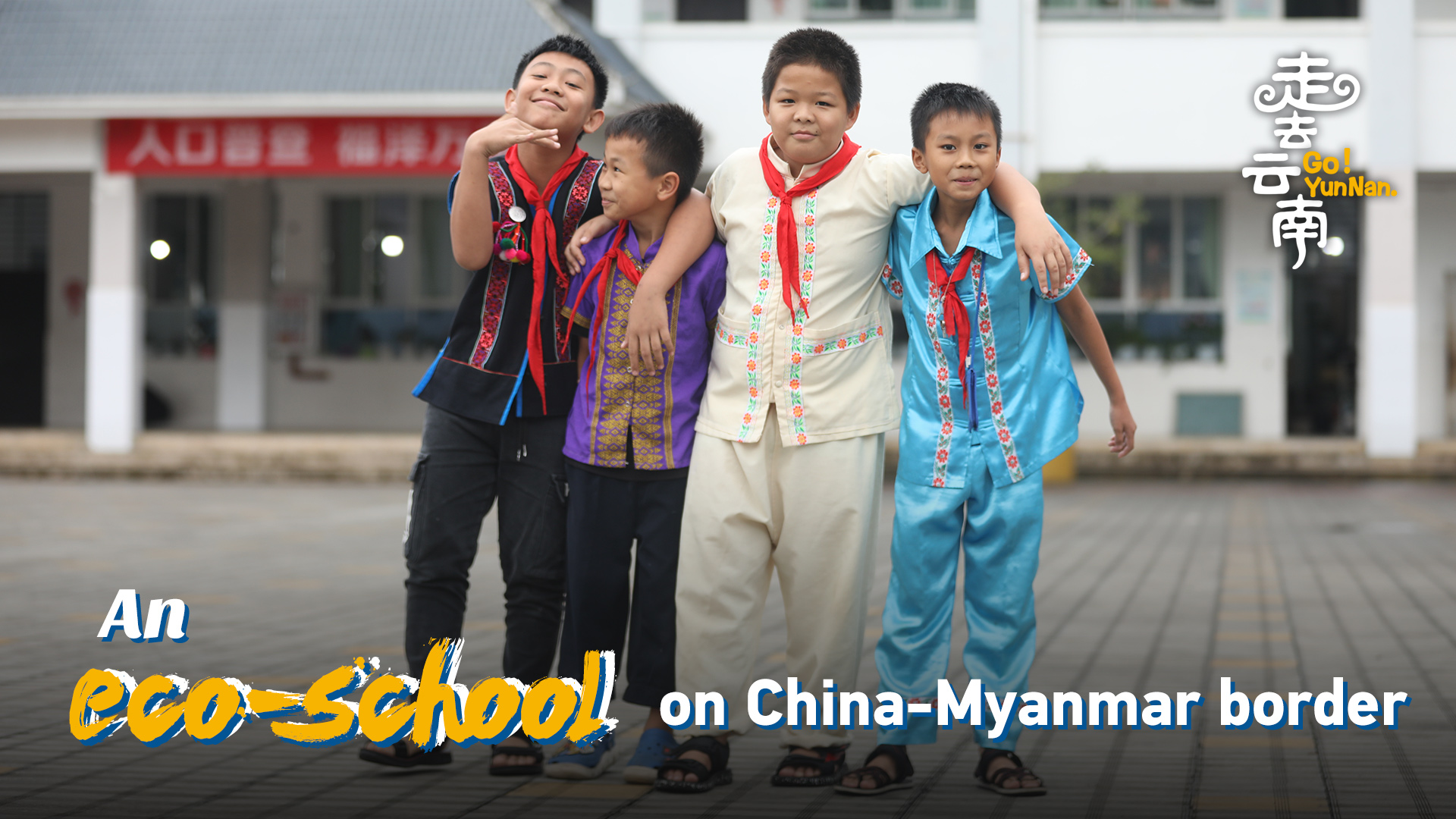
Entering the light yellow-painted school gate, a lively atmosphere can be felt immediately. In Menglong, a quiet small town on China's southwestern frontier in Yunnan Province, Xiaojie Central Primary School is a rare bright spot.
As the bell rang, colorfully-dressed children poured out of classrooms into the playground, turning it into a sea of vibrant shades. But this only happens on Wednesdays, when all students and teachers wear the traditional clothing of their own ethnic groups to celebrate the diverse minority cultures in the region.
Living in harmony
Situated in Xishuangbanna Dai Autonomous Prefecture, 10 kilometers from the border with Myanmar, the school's student body is composed of children from six ethnic groups, mainly Dai and Hani, which make up the majority of the local population, as well as those from neighboring Myanmar. Were it not for their clothes, it wouldn't be easy for an outsider to tell the ethnicity apart, as a mixed crowd frolicked up and down the corridors.
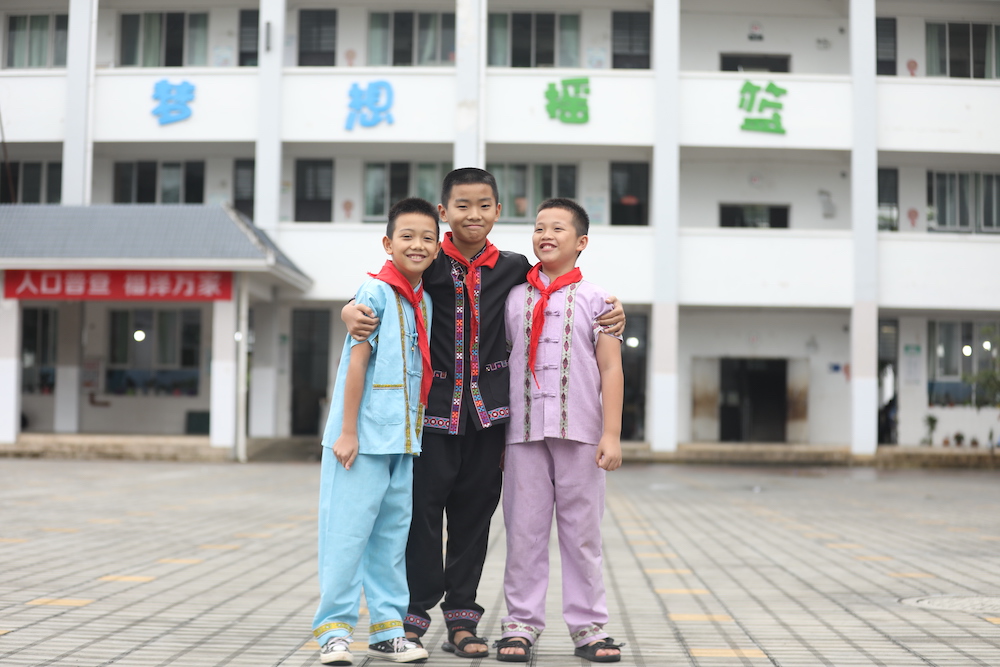
Three boys of Dai and Hani minorities pose for a photo on the playground, October 21, 2020. /CGTN
Three boys of Dai and Hani minorities pose for a photo on the playground, October 21, 2020. /CGTN
"Hello, teacher!" The pupils stopped to greet CGTN team in fluent mandarin, like they do with their teachers, every time an adult walked by on school grounds. "The children speak better mandarin than us teachers," Ye Yingliang, a teacher of the Yi minority, told CGTN.
Ye teaches botanical sciences, a centerpiece in the school's curriculum, which has made it into a renowned "international eco-school." The course is designed to familiarize children with Xishuangbanna's natural riches and unique ecosystem. With help of the Chinese Academy of Sciences, the school is equipped with a small botanical garden where students can study local plants and grow their own.
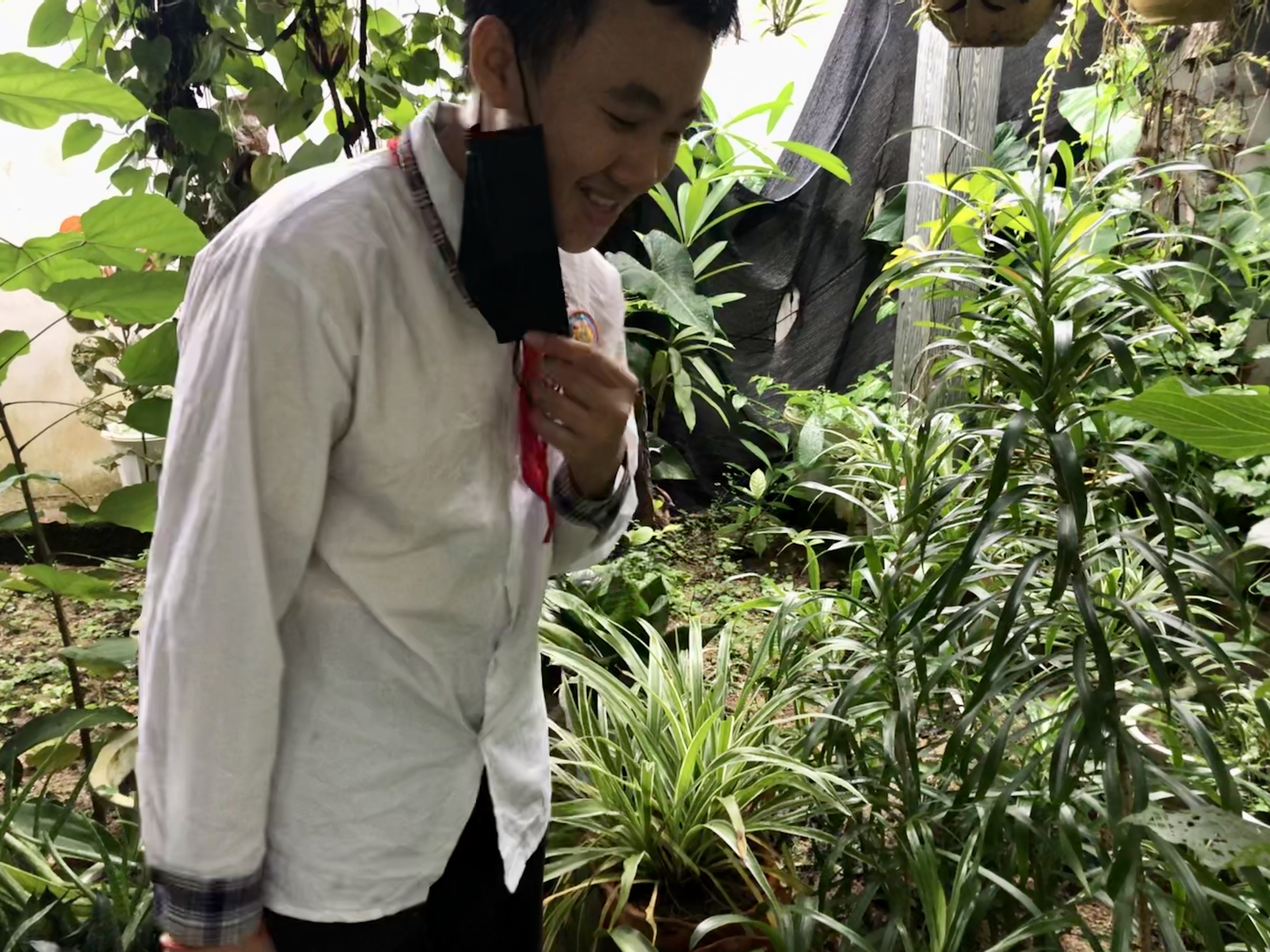
A student shows CGTN his pot plant in the botanical garden at Xiaojie Central Primary School, October 21, 2020. Zhou Minxi/CGTN
A student shows CGTN his pot plant in the botanical garden at Xiaojie Central Primary School, October 21, 2020. Zhou Minxi/CGTN
"By having all kinds of plants around us here in the botanical garden, children can learn about local plants and grow to love their homeland," the school's principal Rao Xinming told CGTN. "Through understanding these plants in the environment surrounding them, they learn to live in harmony with nature."
Harmony is central to the school's culture, epitomized by a ficus tree, or "rong," which has the same sounds with the Chinese words for integration, tolerance and honor. The century-old tree, which has flourished on campus long before the school was built, symbolizes harmony between different ethnicities and between humans and nature, Rao explained.
With a beautiful environment and well-fitted facilities, Xiaojie school easily represents the best education available in an area off the beaten track in tourism-rich Yunnan.
Guardian role
Although Xishuangbanna is famed for its tropical scenery and distinctive ethnic cultures, the frontier town of Menglong, the poorest area of Jinghong City, is hardly on visitors' radar.
However, the area has been known for the complex social issues that come with having a 100-kilometer long national border. Drug trafficking and people smuggling are prevalent, and many criminals smuggle drugs into China through this area, Rao said.
This is apparent by a large slogan in the school that reads, "value life, stay away from drugs." "We are on the front line of the border region," said the principal, who also teaches a class called "morality and rule of law" to the students.
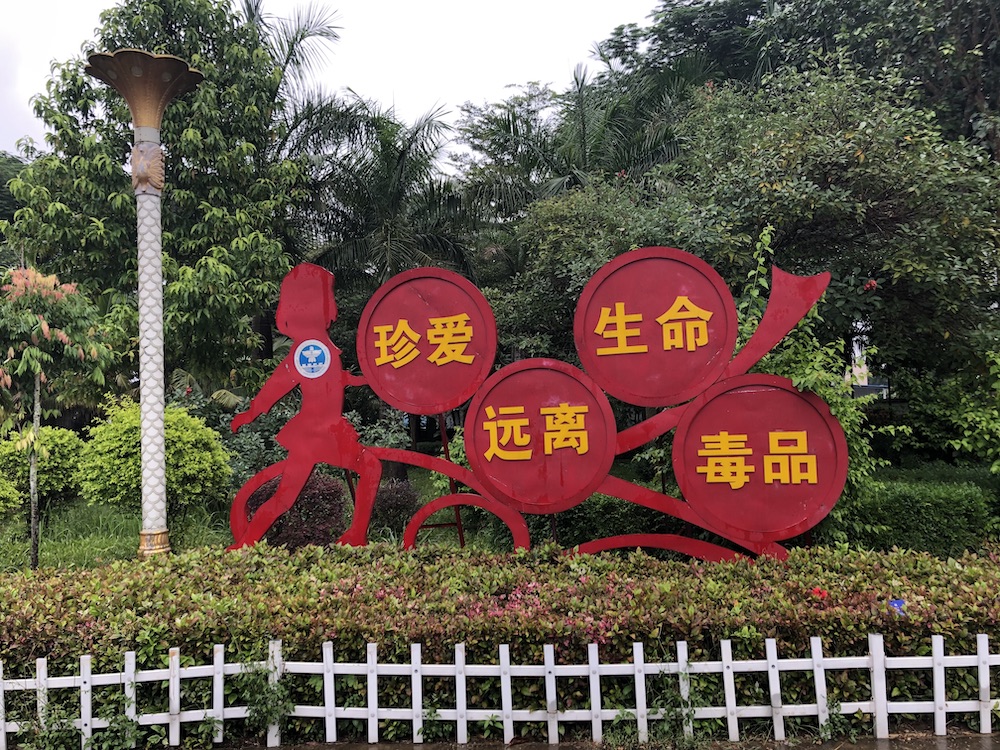
A slogan reads "value life, stay away from drugs" at the school. Zhou Minxi/CGTN
A slogan reads "value life, stay away from drugs" at the school. Zhou Minxi/CGTN
Among the 2,600 pupils at the school, nearly half live on campus. The reason, according to Rao, is that many children live apart from their families for long periods. Some come from remote mountainous areas, and others are left-behind children after their parents migrated for work elsewhere.
"Xishuangbanna's economy used to rely on bananas and rubber, but those companies are not doing well these days. So many people have gone out looking for jobs and entrusted their children to our care," Rao said.
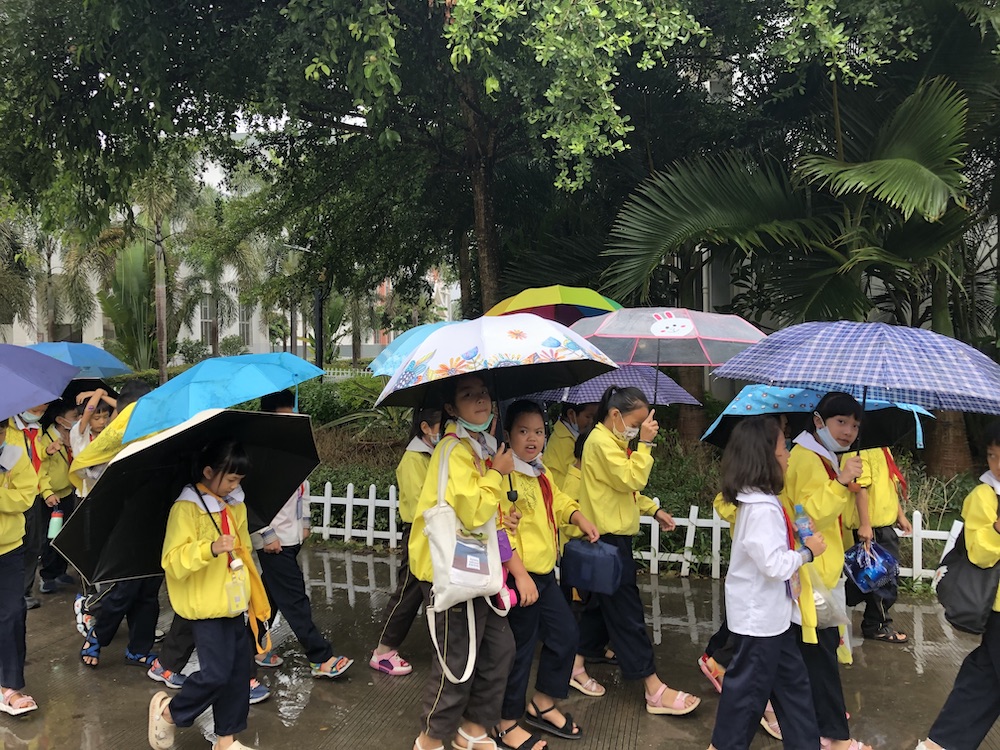
Students on their way from the dormitory to the school canteen. Zhou Minxi/CGTN
Students on their way from the dormitory to the school canteen. Zhou Minxi/CGTN
The school not only fills the role of caretakers for the children, it also takes responsibility for the more than 60 Myanmar students, who haven't been able to return home since February due to border shutdowns by COVID-19.
Following a recent incident of imported coronavirus cases at one of the entry ports on the China-Myanmar border, a strictly enforced border closure has been in place since last month, stranding those regularly crossing for work and school on both sides.
"People in the border region (from both countries) have lived together like this for generations, separated only by a border," Rao said. Before the pandemic, the Myanmar students usually stayed with their relatives in China on weekends. But with intensified epidemic prevention measures and crackdown on irregular migration, the non-Chinese children can hardly leave school now, Rao told CGTN.
Go out and see the world
"I want to go to the north to see snow," Ai Haile, a 10-year-old in Dai clothing, said to a young male teacher as they stood on the steps watching the rain drizzle.
The starry-eyed 4th grader said he loves art classes and won the first prize in a local drawing competition. "My brother and sister won prizes too," the boy said with a big smile.

Artworks created by students on display in the art classroom. Zhou Minxi/CGTN
Artworks created by students on display in the art classroom. Zhou Minxi/CGTN
However, children here rarely go far, and few have seen the world outside Jinghong, the teacher told CGTN.
"People around here are not used to working too hard. They prefer living a relaxed lifestyle and doing fun things like music," said Yang Ningxiao, a music teacher, who is of Hani minority.
Yang was also a student at the school once. Now 30, he said learning conditions have improved significantly over the years, thanks to increased policy support and more resources allocated toward the region. But it is still not easy for children in this small town to compete with those from big cities.
The locals in Xishuangbanna have traditionally benefited from the region's rich natural resources, so education for a long time was not a priority for them, Rao explained.
But the principal wants this to change. Xiaojie school has partnered with another primary school in Shanghai for an exchange program, which gives the children a chance to see the big city, and also for students in Shanghai to experience life on the frontier, he said.
"We want to encourage our students to go beyond this border town and see a bigger world," Rao said, pointing at a statue in the shape of five eyes with a sun, a heart and a dove inside three of them.
"In the eyes of a child, there is sunshine, love and peace. We teach our students with a loving heart. A happy place filled with love is a good start for children," Rao said.
"Education is all about hope."
Videographers: Guo Yuanheng, Zhang Chao, Jie Jingguo, Zhang Dongling
Video editors: Wang Dawei, Zhou Minxi
Article and script written by Zhou Minxi
Producer: Zhang Junfeng
Cover image designed by Yin Yating